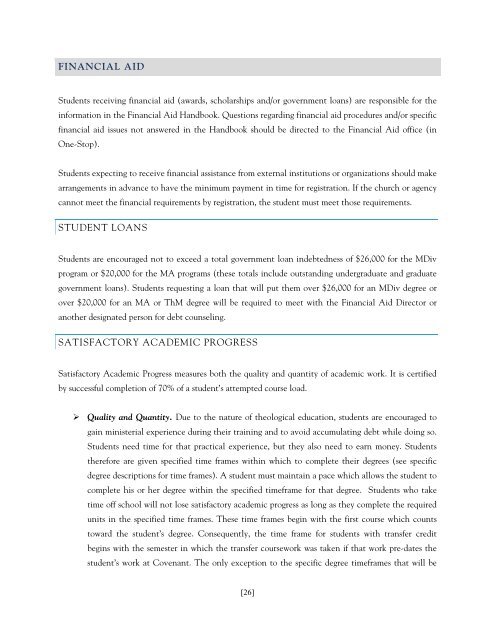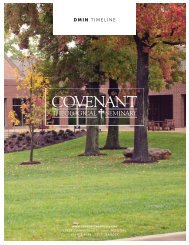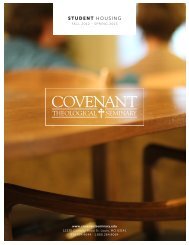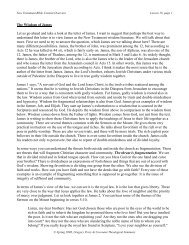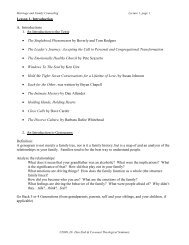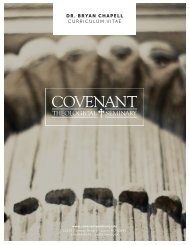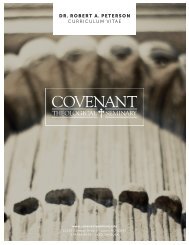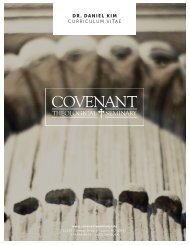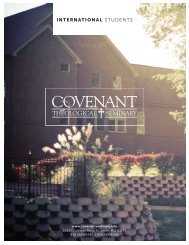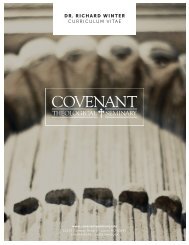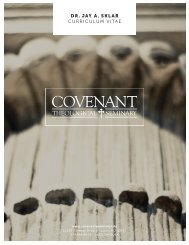Download the Student Handbook - Covenant Theological Seminary
Download the Student Handbook - Covenant Theological Seminary
Download the Student Handbook - Covenant Theological Seminary
You also want an ePaper? Increase the reach of your titles
YUMPU automatically turns print PDFs into web optimized ePapers that Google loves.
FINANCIAL AID<strong>Student</strong>s receiving financial aid (awards, scholarships and/or government loans) are responsible for <strong>the</strong>information in <strong>the</strong> Financial Aid <strong>Handbook</strong>. Questions regarding financial aid procedures and/or specificfinancial aid issues not answered in <strong>the</strong> <strong>Handbook</strong> should be directed to <strong>the</strong> Financial Aid office (inOne-Stop).<strong>Student</strong>s expecting to receive financial assistance from external institutions or organizations should makearrangements in advance to have <strong>the</strong> minimum payment in time for registration. If <strong>the</strong> church or agencycannot meet <strong>the</strong> financial requirements by registration, <strong>the</strong> student must meet those requirements.STUDENT LOANS<strong>Student</strong>s are encouraged not to exceed a total government loan indebtedness of $26,000 for <strong>the</strong> MDivprogram or $20,000 for <strong>the</strong> MA programs (<strong>the</strong>se totals include outstanding undergraduate and graduategovernment loans). <strong>Student</strong>s requesting a loan that will put <strong>the</strong>m over $26,000 for an MDiv degree orover $20,000 for an MA or ThM degree will be required to meet with <strong>the</strong> Financial Aid Director orano<strong>the</strong>r designated person for debt counseling.SATISFACTORY ACADEMIC PROGRESSSatisfactory Academic Progress measures both <strong>the</strong> quality and quantity of academic work. It is certifiedby successful completion of 70% of a student’s attempted course load.‣ Quality and Quantity. Due to <strong>the</strong> nature of <strong>the</strong>ological education, students are encouraged togain ministerial experience during <strong>the</strong>ir training and to avoid accumulating debt while doing so.<strong>Student</strong>s need time for that practical experience, but <strong>the</strong>y also need to earn money. <strong>Student</strong>s<strong>the</strong>refore are given specified time frames within which to complete <strong>the</strong>ir degrees (see specificdegree descriptions for time frames). A student must maintain a pace which allows <strong>the</strong> student tocomplete his or her degree within <strong>the</strong> specified timeframe for that degree. <strong>Student</strong>s who taketime off school will not lose satisfactory academic progress as long as <strong>the</strong>y complete <strong>the</strong> requiredunits in <strong>the</strong> specified time frames. These time frames begin with <strong>the</strong> first course which countstoward <strong>the</strong> student’s degree. Consequently, <strong>the</strong> time frame for students with transfer creditbegins with <strong>the</strong> semester in which <strong>the</strong> transfer coursework was taken if that work pre-dates <strong>the</strong>student’s work at <strong>Covenant</strong>. The only exception to <strong>the</strong> specific degree timeframes that will be[26]


